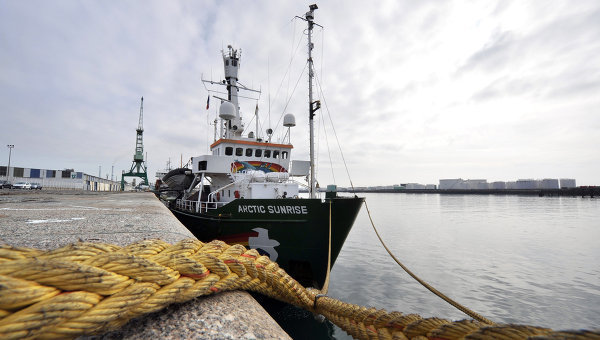HAMBURG, November 22 (RAPSI) - The International Tribunal for the Law of the Sea (ITLOS) in Hamburg ordered the immediate release Friday of the Greenpeace Arctic Sunrise vessel and all persons detained along with it, upon the posting of a bond or other such financial security by the Netherlands.
This is a provisional measure prescribed pending a decision by an arbitral tribunal.
The judgment states: "As a consequence of the actions taken by the Russian Federation in connection with the boarding and detention of the ‘Arctic Sunrise’, the crew would continue to be deprived of their right to liberty and security as well as their right to leave the territory and maritime areas under the jurisdiction of the Russian Federation. The settlement of such disputes between two states should not infringe upon the enjoyment of individual rights and freedoms of the crew of the vessels concerned."
According to the judgment, the Netherlands will be required to post a bond or other financial security in the amount of EUR 3,600,000 to secure the release. The judgment goes on to stipulate that upon the posting of the bond or other financial security, Russia shall ensure the release of the Arctic Sunrise vessel and all persons detained, and that specifically they should be, “allowed to leave the territory and maritime areas under the jurisdiction of the Russian Federation.”
These provisional measures were adopted in a vote of 19 to two. The votes against came from Russian Judge Vladimir Vladimirovich Golitsyn and Ukrainian Judge Markiyan Kulyk.
Also by a vote of 19 to two, the same judges voting against, the tribunal held that Russia and the Netherlands are each expected to submit initial reports by December 2, 2013. These reports should contain information on compliance with the provisional measures prescribed.
RAPSI consulted maritime law specialist Douglas Burnett, partner at Squire Sanders (US) LLP law firm in New York, for some expert commentary on the case.
When asked whether the order was enforceable against Russia, Burnett told RAPSI that enforcement in this case would depend upon voluntary compliance on the part of Russia. He noted that there have been numerous quick-release decisions, and in each case the countries involved have voluntarily complied. He mentioned by way of an example a case between Russia and Japan, where Russia complied with the tribunal’s order to release a Japanese fishing vessel.
He explained that this was a predictable outcome in the case, because it was essentially a default proceeding – as Russia refused to participate. He explained, “When you have a situation where only one side puts in evidence and arguments, it’s not necessarily a surprise that the majority of the justices accepted those arguments.”
He suggested that Russia could have pursued the alternative option of arguing to the court that it lacked jurisdiction, while still reserving its rights not to participate. In Burnett's view, “That would have had the advantage of being able to put in a contrary point of view to the argument advanced by the Netherlands.” He notes that the court really only had the Dutch version of the facts to work with, and Russia could have challenged some of the factual assertions advanced.
Burnett noted: “Russia had the right to do what they were doing. The Netherlands – the crew and the vessel – did not have the right to essentially try to board, against resistance, that platform. So those are the substantive arguments that I think Russia has a very strong case on. But you have to ultimately find a place to argue those rights.”
RAPSI further consulted with Mikhail Vitenko, Law of the Sea expert and Chief Editor of Maritime Bulletin, who had the following to say: "The tribunal, as expected, offered a comprimise option, and for the most part - Russia is not obligated to comply with the decision. This remains at [Russia's] discretion." He added that it is common practice within the shipping industry for a vessel to be released on bond pending consideration of a dispute on the merits. This is more a commercial measure than a political one, he explained, adding that in principal, sanctions cannot be imposed for the non-enforcement of a judgment in such cases.
The Russian Ministry of Foreign Affairs told RIA Novosti in a comment Friday evening that Russia will study the judgment of the International Tribunal for the Law of the Sea and formulate its attitude afterwards.
The Arctic Sunrise ship was seized by Russian border guards on September 19 in international waters, within Russia's exclusive economic zone, a day after two Greenpeace activists scaled the Prirazlomnaya drilling rig in the Pechora Sea, the southeastern part of the Barents Sea.
The platform, owned by Gazprom Neft Shelf, a subsidiary of Russian energy giant Gazprom, is the first ice-resistant stationary oil platform in the world set to produce offshore Arctic oil.
Greenpeace and other environmental groups oppose drilling for oil in the Arctic because they say that it is currently impossible to sufficiently clean up potential oil spills in the region, and that such drilling cannot be economically viable.
On October 21, the Netherlands filed a request with the International Tribunal for the Law of the Sea to inflict interim measures which must be taken before the trial on the merits to protect the interests of the party in the dispute.



